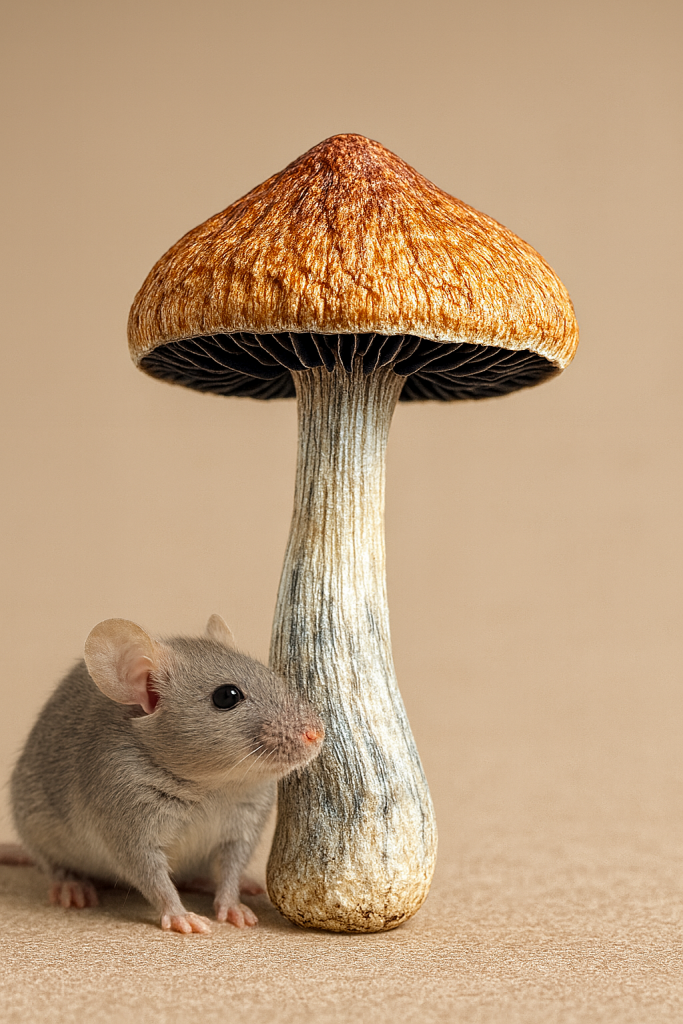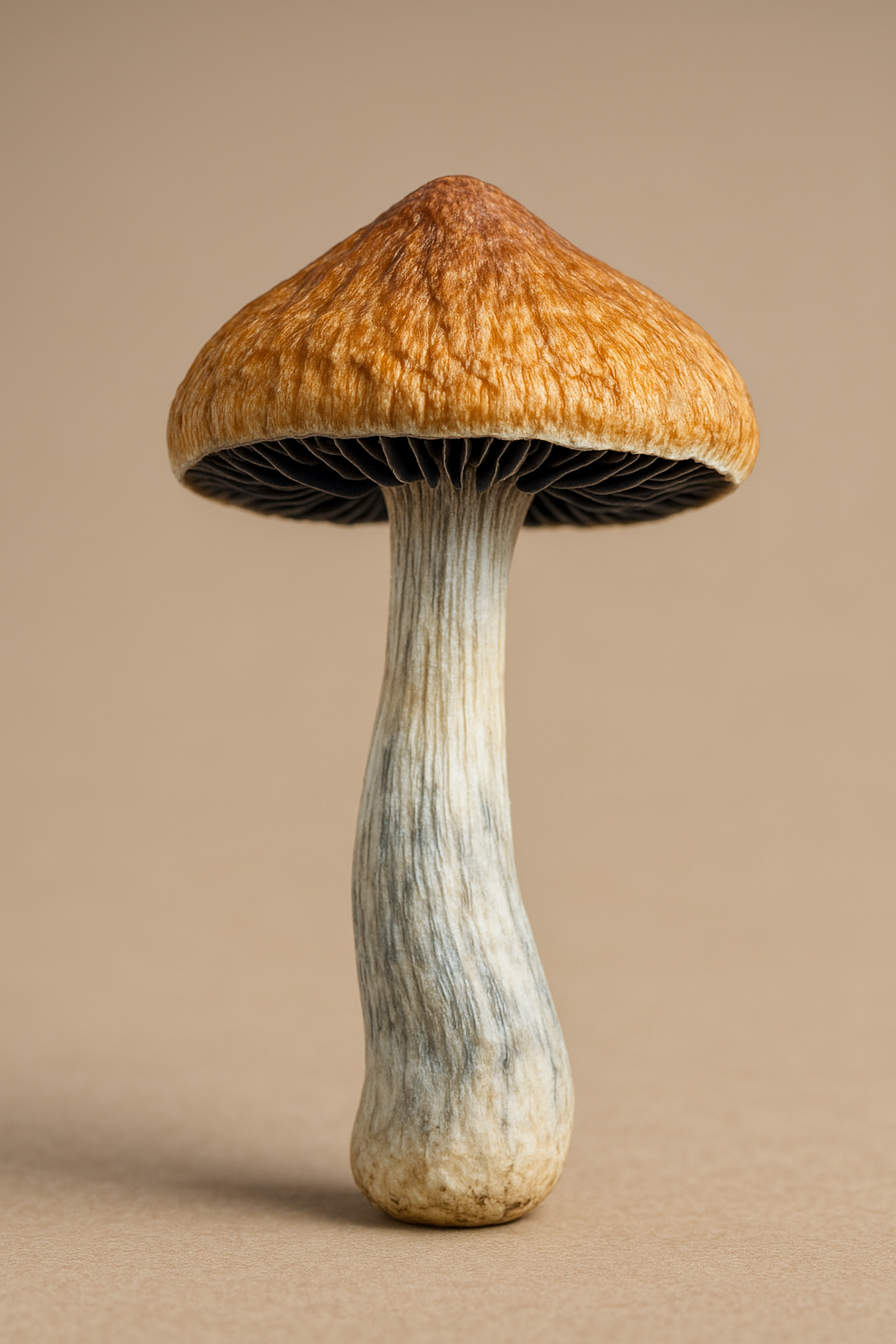Psilocybin, the psychoactive compound in magic mushrooms, has been studied for its effects on depression, anxiety, addiction, and end-of-life distress for decades. Now, a new preclinical study from Emory University and Baylor College of Medicine, published in npj Aging, suggests that psilocybin may also influence biological aging, at least in cells and mice.
In this work, researchers showed that psilocin, the active metabolite of psilocybin, extended the lifespan of human cells in culture by more than 50%. They also found that aged mice given psilocybin lived longer than untreated mice and appeared physically healthier, as determined by basic visual inspection.
Why Scientists Looked at Psilocybin and Aging
Psilocybin is already the subject of more than 150 completed or ongoing clinical studies for psychiatric, neurodegenerative, pain, and other conditions.
One proposed explanation for its broad impact is the psilocybin–telomere hypothesis, which sits at the intersection of mental health and biological aging. This hypothesis is based on several observations:
- Clinical depression, chronic stress, and anxiety have been associated with shorter telomeres, the protective caps at the ends of chromosomes that tend to shorten with age.
- More positive psychological states have been linked to longer telomeres or slower telomere shortening.
- Human studies have shown that single high-dose psilocybin sessions can produce long-lasting improvements in mental health symptoms, with some benefits reported to persist for years.
These findings led researchers to ask a straightforward but previously untested question: Does psilocybin (or its active metabolite, psilocin) directly influence cellular aging processes, rather than acting only indirectly through psychological changes?
Psilocin Made Human Cells Live Longer
To test this, the team used two types of human cells that are widely employed in aging research: human fetal lung fibroblasts (IMR-90) and adult human skin fibroblasts. In both cases, cells were grown in the lab and repeatedly passed, meaning they were allowed to divide until they reached replicative senescence, a state in which they permanently stop dividing. Psilocin was added continuously to the culture medium at different concentrations.
In lung fibroblasts, psilocin produced an apparent, dose-dependent effect on cellular lifespan:
- At 10 µM psilocin, cellular lifespan increased by about 29% compared to control cells.
- At 100 µM psilocin, lifespan increased by about 57%.
Psilocin-treated cells entered senescence later than control cells, showed lower activity of senescence-associated β-galactosidase, and had reduced levels of the cell-cycle arrest proteins p16 and p21.
At the same time, markers of cell proliferation and DNA replication (such as PCNA and phosphorylated Rb) were increased. The cells also exhibited higher levels of SIRT1, a protein involved in regulating cellular aging and stress responses, and lower levels of GADD45a, consistent with reduced DNA damage signaling. Measures of oxidative stress were also reduced, along with changes in key regulators, including a decrease in Nox4 and an increase in Nrf2.
Importantly, psilocin-treated cells ultimately reached senescence and showed no evidence of uncontrolled, cancer-like growth under the tested conditions.
When the experiment was repeated in adult human skin fibroblasts with 100 µM psilocin, the results were similar. Cellular lifespan increased by approximately 51%, and markers of senescence decreased, accompanied by reductions in oxidative stress.
Taken together, the in-vitro data indicate that psilocin can delay cellular senescence, extend the proliferative lifespan of human fibroblasts, reduce oxidative stress, and help maintain telomere length under these laboratory conditions.

Psilocybin Helped Aged Mice Live Longer
The second part of the study moved from cell culture to an animal model. Here, the researchers asked whether psilocybin could influence survival in aged mice.
Female C57BL/6J mice, 19 months old at the start of the study (roughly equivalent to 60–65-year-old humans), were randomly assigned to receive either psilocybin or a control solution by mouth. In the first month, the psilocybin group received a 5 mg/kg dose to acclimate the animals. For the following nine months, they received 15 mg/kg once per month. Control mice received the same volume of saline without psilocybin. All mice were monitored for 10 months after the first dose, and the study ended when one group reached 50% mortality.
At the end of the study period, 80% of psilocybin-treated mice (24 out of 30) were still alive, compared with 50% of control mice (14 out of 28). This difference in survival was statistically significant.
Beyond survival, the researchers observed differences in physical appearance.
Psilocybin-treated mice appeared to have better fur quality, more hair growth, and fewer white hairs. These observations were based on photographs and visual inspection and were not quantified with specific scoring systems.
How Might Psilocybin Influence Aging Pathways?
Psilocybin is converted in the body to psilocin, which interacts with serotonin receptors, especially the 5-HT2A receptor. These receptors are expressed not only in the brain but also in many other tissues, including fibroblasts, heart muscle cells, endothelial cells, epithelial cells, and immune cells.
The authors highlight several mechanisms that may help explain the findings:
- SIRT1 activation and antioxidant defenses
- Previous work in neurons has shown that stimulating 5-HT2A receptors can increase SIRT1-dependent expression of antioxidant enzymes, reducing oxidative stress and providing neuroprotection.
- In the current study, psilocin increased SIRT1 levels in fibroblasts and reduced markers of oxidative stress, suggesting that similar pathways might be involved in non-neuronal cells.
- Oxidative stress and DNA-damage responses
- Psilocin treatment reduced reactive oxygen species (ROS) and lowered levels of Nox4, a key regulator of oxidant production.
- It also altered DNA-damage response proteins such as GADD45a in a manner consistent with reduced DNA stress.
- Telomere preservation and delayed senescence
- By helping preserve telomere length and delaying the onset of replicative senescence in fibroblasts, psilocin appears to influence several recognized “hallmarks of aging,” including telomere attrition, cellular senescence, and altered intercellular communication via oxidative stress pathways.
Psilocybin may reduce oxidative stress, improve DNA repair responses, and preserve telomere length, processes that are closely tied to aging and age-related diseases such as cancer, neurodegeneration, and cardiovascular disease.
What This Early Study Shows
While these early-stage, preclinical findings are notable, they come with important caveats. The cellular experiments were done in cultured fibroblasts under controlled laboratory conditions, and the animal data are from a single long-term study in aged female mice, using a single dosing regimen and a single strain of mice.
As a result:
- It is not known whether similar lifespan or cellular effects would occur in humans.
- The optimal dose, frequency, and timing of psilocybin treatment for any potential aging-related benefits are unknown.
- The study used only female mice; possible sex-specific effects remain to be explored in future work.
- Although psilocin-treated cells ultimately senesced and did not show signs of transformation in vitro, the authors note that delaying senescence and extending proliferative potential could have complex implications for cancer risk, which must be carefully studied in future in vivo work.
The regulatory context is also important. Psilocybin remains a Schedule I substance under U.S. federal law, and the authors point out that this classification, along with limited federal funding, continues to slow research on its long-term systemic effects.
A New Angle on an Old Molecule
Taken together, the study by Kato and colleagues provides the first direct experimental evidence that psilocin and psilocybin can affect several hallmarks of aging in human cells and in a mouse model, including telomere maintenance, oxidative stress, and cellular senescence, as well as survival in aged animals.
These results do not show that psilocybin is an anti-aging therapy for humans, nor do they justify self-medication. Instead, they open a new line of inquiry regarding how a compound best known for its psychological effects might also interact with fundamental aging pathways throughout the body.
Future studies, particularly in humans, are needed to determine whether these preclinical findings translate into meaningful changes in healthy aging, disease risk, or quality of life later in life. For now, the work offers a carefully measured but genuinely new perspective on psilocybin: not only as a potential tool in mental health care, but also as a molecule that may warrant further investigation in the biology of aging.
AUTHOR

MSc Student in Neuroscience, background in Cell and Molecular Biology
Sogol is a graduate student with a growing passion for understanding the biological mechanisms that underlie brain function and human behavior.
Her academic journey began in Tehran, where she earned a Bachelor’s degree from the Islamic Azad University of Pharmaceutical Sciences (IAUPS). Wanting to deepen her knowledge of human biology, she pursued a Master’s in Medical Biology at the University of Salzburg (Paris Lodron University) in Austria.
However, before completing that program, her curiosity about the brain led her to Greece, where she continued her studies with a Master’s in Neuroscience at the National and Kapodistrian University of Athens (NKUA).
Alongside her academic work, Sogol conducts research on psychedelics, examining how these compounds influence neurobiology, resilience, emotional processing, and human behavior. As a mental well-being and life coach, she supports her clients in cultivating clarity, emotional balance, and meaningful personal growth, integrating scientific insight with a human-centered approach.













